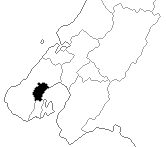Wellington Central by-election, 1992
|
|
|||||||||||||||||||||
|---|---|---|---|---|---|---|---|---|---|---|---|---|---|---|---|---|---|---|---|---|---|
|
|||||||||||||||||||||
| Turnout | 15,644 (63.30%) | ||||||||||||||||||||
|
|||||||||||||||||||||

Wellington Central electorate boundaries used for the by-election
|
|||||||||||||||||||||
|
|||||||||||||||||||||
The Wellington Central by-election 1992 was a by-election held in the Wellington Central electorate during the 43rd New Zealand Parliament, on 12 December 1992. It was caused by the resignation of incumbent MP Fran Wilde after her election as mayor of Wellington and was won by Chris Laidlaw with a majority of 855.
Although Labour were gaining ground in opinion polls, the party was cautious on the heels of the recent Tamaki by-election where their candidate finished a distant third. Leader Mike Moore said that the quality of the candidates would be "absolutely crucial" to deciding the outcome.
Labour's candidate in the Tamaki by-election, Verna Smith, was "interested" in standing though decided to put her efforts into winning the candidacy for Titirangi in the lead up to the 1993 general election. Past President of the Public Service Association, Sue Piper contemplated standing. Former All Black Chris Laidlaw expressed his interest in standing for the seat immediately. He then held the position of New Zealand's Race Relations Conciliator.
National's candidate from the 1990 general election Pauline Gardiner (who lost by only 246 votes) announced she intended to stand again for the seat. The other nomination for the National candidacy was British-born Barbara Stones, a nursing lecturer at Wellington Polytechnic Another ex-All Black, David Kirk, was approached by National to stand for the seat, though he declined nomination. Wellington City Councillor Rex Nicholls, who regained a seat on the council in 1992 after failing to win the Mayoralty in 1989, also considered standing.
...
Wikipedia


